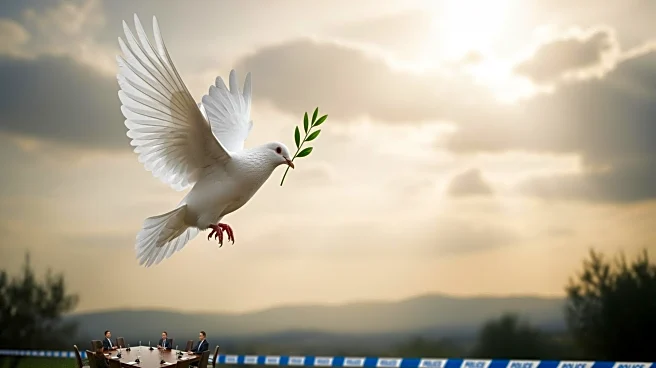What's Happening?
The Red Cross has successfully facilitated the return of the body of Eliyahu Margalit, a 75-year-old Israeli hostage, from Gaza to Israel. Margalit was killed on October 7 and his body was taken from Nir
Oz kibbutz into Gaza. This development comes amid ongoing tensions between Israeli forces and Hamas, despite a ceasefire agreement. The ceasefire, brokered by the U.S., included the release of 250 Palestinian prisoners and 1,718 detainees from Gaza by Israel. However, the agreement has faced challenges, as Hamas has accused Israel of hindering efforts to retrieve all hostages' remains due to restrictions on heavy machinery needed for searches. The Israeli Defense Forces (IDF) have stressed the importance of Hamas upholding the agreement to return all hostages. Meanwhile, the humanitarian situation in Gaza remains dire, with significant destruction and ongoing recovery efforts.
Why It's Important?
The return of Margalit's body highlights the complex humanitarian and political challenges in the region. The ceasefire agreement, while a step towards de-escalation, is fraught with difficulties, including the retrieval of hostages' remains and the ongoing humanitarian crisis in Gaza. The situation underscores the fragile nature of peace efforts and the significant obstacles to achieving lasting stability. The humanitarian impact is severe, with widespread destruction in Gaza and urgent needs for aid, shelter, and medical services. The international community, including the U.S., plays a crucial role in mediating and supporting recovery efforts, but the path to peace remains uncertain. The situation affects regional stability and has broader implications for international relations and humanitarian policies.
What's Next?
As the ceasefire progresses, further negotiations and actions are expected to address the retrieval of remaining hostages and the humanitarian needs in Gaza. The U.S. and other international stakeholders will likely continue to engage with both Israeli and Palestinian authorities to ensure compliance with the ceasefire terms and to facilitate humanitarian aid. The IDF's continued operations in parts of Gaza and the potential for further violence remain concerns. The success of the ceasefire and subsequent peace efforts will depend on the cooperation of both parties and the support of the international community.
Beyond the Headlines
The ongoing situation in Gaza raises significant ethical and legal questions regarding the conduct of military operations and the protection of civilians in conflict zones. The challenges in retrieving hostages' remains and providing humanitarian aid highlight the complexities of international humanitarian law and the responsibilities of occupying forces. The situation also reflects broader geopolitical dynamics, including the role of the U.S. and other international actors in mediating conflicts and supporting peace processes. Long-term solutions will require addressing underlying political and social issues, including the rights and aspirations of both Israelis and Palestinians.










